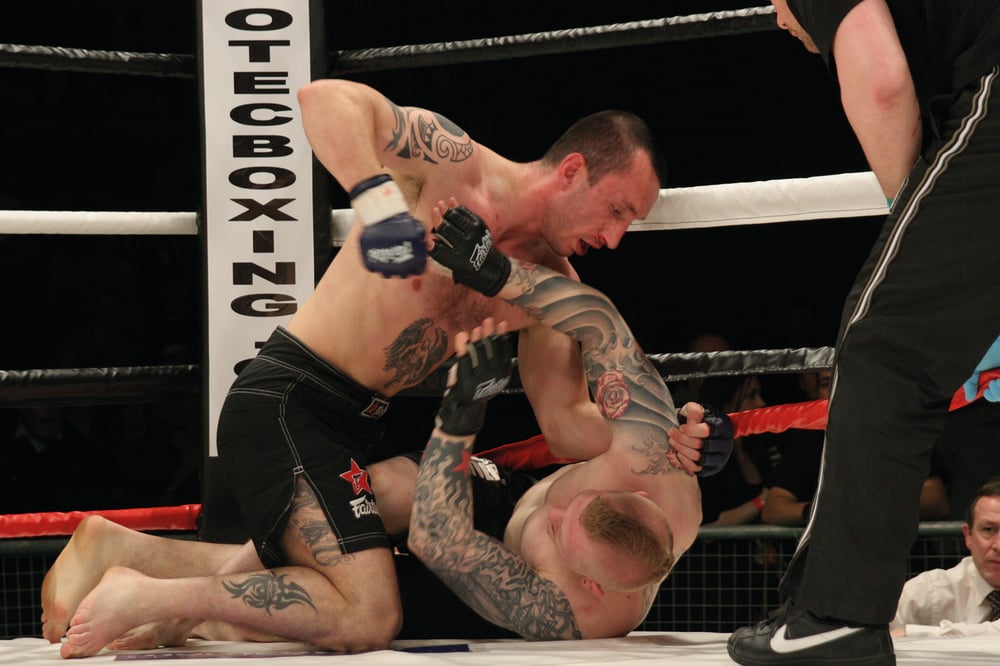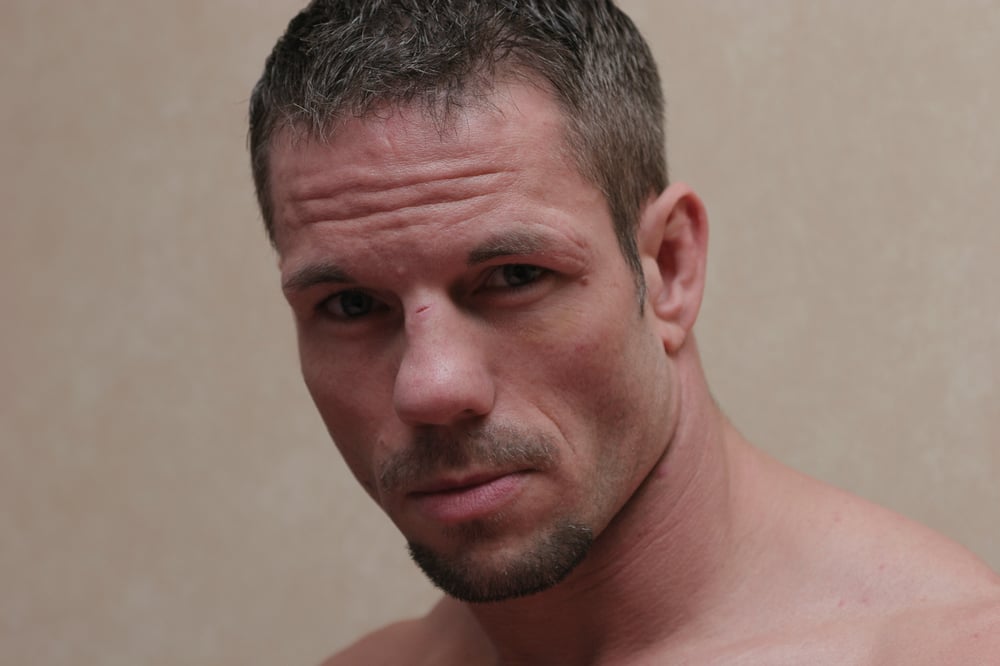
Issue 055
October 2009
Prize fighting has always been about putting things in order. In a sport without fixed schedules and league standings, a man’s worth is judged on his performances as much as his results. As well as rankings and titles there are a host of unofficial labels that denote a fighter’s place in the grand scheme of things. Mick Bower examines the eight common types of fighter.
1 The Rookie
Go to any local show and you’ll see plenty in action. They are easy to spot – no amount of training can fully prepare a man for being maliciously punched, kicked and thrown around a cage in public. Even those who are ready for it will betray their naivety by their stiffness and forced smiles, the over-rehearsed combinations that are going to get thrown whether there’s an opening or not.
Game plans fly out of the window as the heady cocktail of crowd noise and adrenaline pushes our heroes forward at 100 miles per hour. They don’t call them ‘rookie mistakes’ for nothing. Men are drawn to the cage for a variety of reasons: money, fame, competitive spirit, a chance to impress girls. For many it’s a one-off that ends with them kneeling on the canvas shaking their head and rubbing their aching joints. Those who stick with it pick up something new from every outing. They may feel the need to bite the celery bullet and drop a weight class to maximize their effectiveness. Going to the gym is no longer an end in itself, just a step on the road to the next appointment under the bright lights.
Even those who come to MMA from other combat sports face a sharp learning curve. Brock Lesnar was an elite-level college wrestler with years of feeling the heat of WWE crowds under his belt, yet his second MMA fight saw him blow a winning position with a foul punch fuelled by over-enthusiasm before offering Frank Mir a knee bar on a plate. Everyone is entitled to make a rookie mistake (or two). Unlike most newcomers, he had a packed house at the Mandalay Bay and millions of TV viewers picking his performance apart.
Notable Examples:
Head to a regional show and check out the undercard. That’s where you’ll find the rookies.
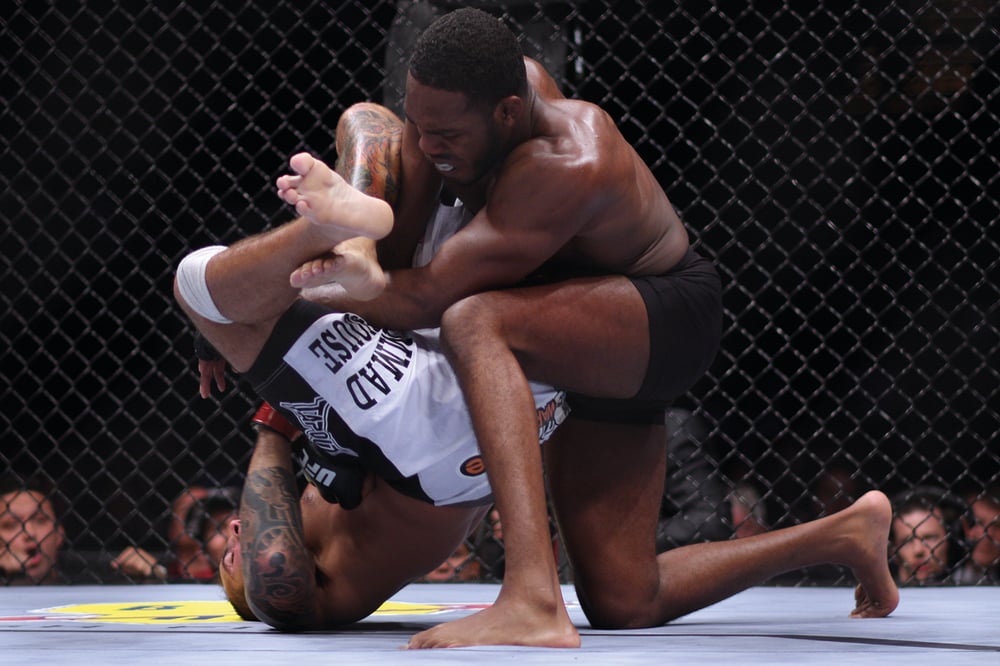
2 Prospect
For those with the talent and the temperament, there is a well-trodden career path to the top. You make a name fighting on small hall shows, you creep up the card, notching wins and clocking up valuable cage time. The biggest cheers ring out for the biggest ticket sellers, but the shrewd observers will soon notice anyone who has the X factor. Consequently, a kid with promise turns into a prospect. Someone with a genuine shot at going all the way.
A prospect is a discovery you want to tell your friends about. After a run of early stoppage wins in the North East, a contract with the UFC propelled Jon Jones onto the big stage. The common reaction of everyone who sees him is, “Wow”. Winning his first three UFC fights isn’t even half the story. ‘Bones’ demonstrated the
explosive takedowns you would expect from a guy with a wrestling background. He also let rip with an array of extravagant spinning elbows, fists and kicks. Behind the flash moves, you can see a cool head willing to go the distance when necessary. Jon Jones is one of the men of the moment – he’s the guy who is being touted as a main-card player and a future contender. Sure, there are more deserving older heads who have built a rep over the years. So what? In the fight game, marketability trumps fighting ability. We want to be a step ahead. We want to see the hot prospects such as Jon Jones.
Notable examples:
Light heavyweight fighter Jon Jones is the perfect example, but for a dazzling array for men fighting their way up the ladder, check out the burgeoning WEC, where the lay of the land is less settled than in the UFC – almost everyone who’s not a title holder in the WEC can be considered a prospect.
3 The Gatekeeper
Everyone ends up at their natural level. Sure there are plenty of hard-luck stories, but the victims of injury, ‘politricks’ and being born in the same era as people who are way better than them have to accept their lot in life. A handful will go on to become champions; a multitude will feel their aching ribs the morning after their debut, carefully roll into a comfortable position, and try to forget about the whole dumb idea. The rest will be all they can be. At each step up they will be greeted by a gatekeeper.
A gatekeeper knows his worth. He’s been around the block and discovered his limits. Anyone who thinks they deserve a place in the VIP club has to muscle their way past him first. Take Marcus Davis; the TUF 2 grad has developed into a solid all-rounder, but it’s hard to imagine him troubling bona fide contenders. Instead, the UFC have hired the ex-boxer to work on the door of their welterweight top ten. The New Englander checks the credentials of any newcomer hoping to gain entry – if you’re name’s not down, you’re not coming in.
Gatekeepers can be found on every show. Lowly affairs tend to have a grizzled slugger who tests the reflexes and chins of up-and-comers with a few W’s on their records. At the other end of the scale, Rich Franklin came off two defeats in title fights with Anderson Silva and was left with a stark choice. As no-one had the stomach for a third helping, he had to either accept life as a perennial final eliminator, or get the hell out of the middleweight division. Franklin wasn’t ready to settle for life as a gatekeeper – he chose to move up to 205lb in order to reinvigorate his career.
Notable Examples:
Ed Herman and Alan Belcher are two excellent examples of the gatekeeper. If you’re good enough to get past them, then welcome to the club. If not, you’re sent on your way.
4 The Journeyman
The term journeyman was originally used to describe a boxer with little or no expectation of winning his fights. He was said to be “along for the journey”. Journeymen are generally competent boxers who can take punishment. As well as the human heavy-bags who pad the records of the golden boys on the rise, there are plenty of older guys on the circuit who will punish any slips. Even the greatest of them all, Sugar Ray Robinson, stuck around well after his prime to ply his trade in the small halls.
For the journeyman class, MMA is a more forgiving mistress than boxing. The guile and experience built up over a career can make an old timer with a grappling base a particularly tricky opponent. There is a sizeable group of fighters who, despite it being clear that they will never hit the dizzy heights younger fighters chase after, choose to struggle on. Their motives are no doubt similar to those of the rookies: A few bucks in their pocket and a love of competition.
Some big-name veterans are still doing the rounds. Ken Shamrock fights on, as does his UFC 1 victim, Patrick Smith (who KO’d TUF 2 finalist Brad Imes earlier this year) Both have some way to go to catch up with Dan Severn; the two-time UFC champ last appeared in the Octagon in 2000, but his trademark moustache remains a common sight in rings and cages across the globe. With well over 100 matches to his name, the 51-year-old is still going strong with two wins already this year. These are the exceptions; the typical journeyman is not even a household name in his own household, but they are the unsung heroes who keep the sport going.
Notable Examples:
Ricco Rodriguez comfortably describes himself as a journeyman, but in the classical sense as he will travel almost anywhere for a fight. A former UFC heavyweight champion, Rodriguez has been through almost all eight incarnations of the fighter. For an extreme example, look to Jeremy Horn, who has over 100 fights.
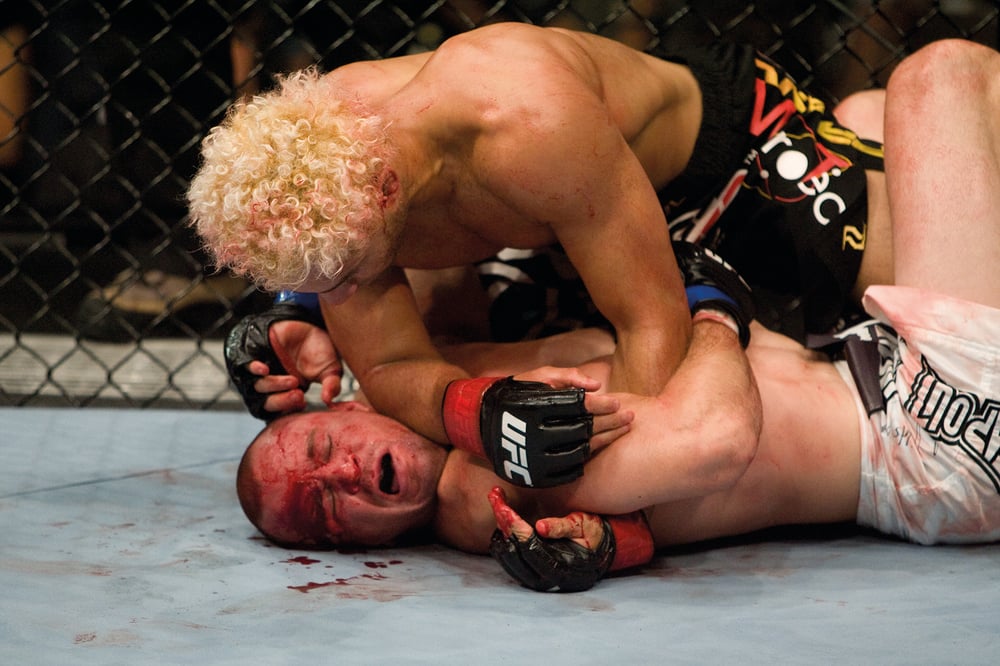
5 Contender
“I coulda had class. I coulda been a contender. I coulda been somebody.”
The famous words of Marlon Brando as Terry, the put upon ex-fighter in On the Waterfront.
A contender is someone who has arrived. The whispers are so loud they can’t be ignored. The name features in every top ten list and comes up in any discussion about the future of the weight division. Every fight’s on TV; a contender is a ‘somebody’. As they are someone who matters, every one of their fights matter. There is no more time for learning, and the knives are out after every hiccup.
Josh Koscheck has experienced the highs and lows of the contender role. The outstanding wrestler ignored the fans that called his style boring and put together a tidy unbeaten sequence. Kos found himself in what was effectively a final eliminator against GSP, one step from the Holy Grail. Three rounds and a negative decision later and he was back with the pack. Josh reinvented himself as striker. His former critics were won over and his spectacular KO of Yoshiyuki Yoshida confirmed his resurrection. For the first three minutes of his UFC 95 clash with Paulo Thiago, the Kos war wagon was cruising. But then the Brazilian landed a right uppercut followed by a left hook, and it flew off the rails into a ditch. Internet forums quickly filled with ‘experts’ stating that Kos was useless on his feet and should have stuck to the lay and pray tactics. The quest starts again.
A contender is only as good as his last fight, and his next is always his most important. The belt, specifically his proximity to it, defines him. Each win edges him closer, each defeat emboldens those looking to overtake. The young bucks sense a gap opening in the line that they can leapfrog into and the call-outs begin. A few contenders make it to the ultimate prize. The rest must make the most of their time in the spotlight before they are replaced by younger, hungrier versions of themselves.
Notable Examples:
Men such as Mike Swick and Martin Kampmann (who fight for a shot at GSP’s title this September). Any of the fighters who hover in the top five of the rankings are contenders.
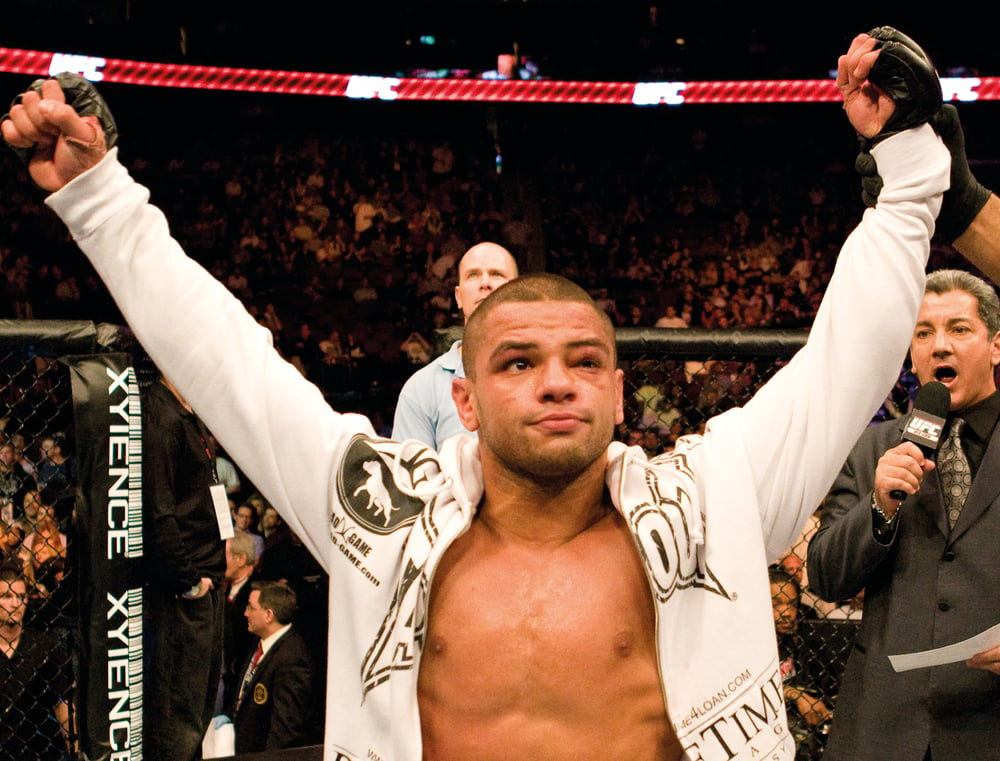
6 Challenger
A challenger should be the man most deserving of a title shot, a guy who has put on a series of performances establishing him as the number one contender. The best of the rest – if only. Remember, this is the fight game we’re talking about.
There are a million reasons why people get a chance to fight for a title. The anarchic world of MMA encourages political plotting. A promotion has to be sure that any potential champ is not going to be vacating his title to chase bigger pay-days elsewhere. Anyone who is not willing to sign long-term options will have to get used to watching big fights from the bench. Even if you’re a good boy, a major new signing may take your place in line.
Sometimes your face just doesn’t fit. On form, Lyoto Machida was worthy of a crack at the UFC light heavyweight belt a couple of years ago, but his name was rarely mentioned. His ‘safety first’ style was a huge turn off for many fans and a succession of more electrifying, English-speaking candidates were pushed ahead of him. Machida then delivered a huge right hand that knocked Thiago Silva out cold and made Machida flavor of the month. Overnight, all barriers to a championship fight miraculously disappeared. Lyoto made good on his side of the deal and wrecked Rashad Evans to take the belt. With many observers tipping Machida to remain unbeaten, we may well see another kind of challenger at 205lb soon, namely any credible person left in the division who has not yet been spanked by the dominant champ.
Challengers who fluff their lines on their big night face a bleak future. Careers need a narrative to drive them. An unsuccessful bid puts you out of the picture. Unless you’re dealing in blue-chip names, rematches are a hard sell. Keeping a failed challenger in fights that mean something until their turn comes around again is a tough task. For better or worse, a title challenge will be the defining moment of a career.
Notable Examples:
Take one look at the men who have tried and failed in an attempt at the belt. Thiago Alves was a classic contender and has been sent tumbling back down the welterweight ladder, as was Jon Fitch.
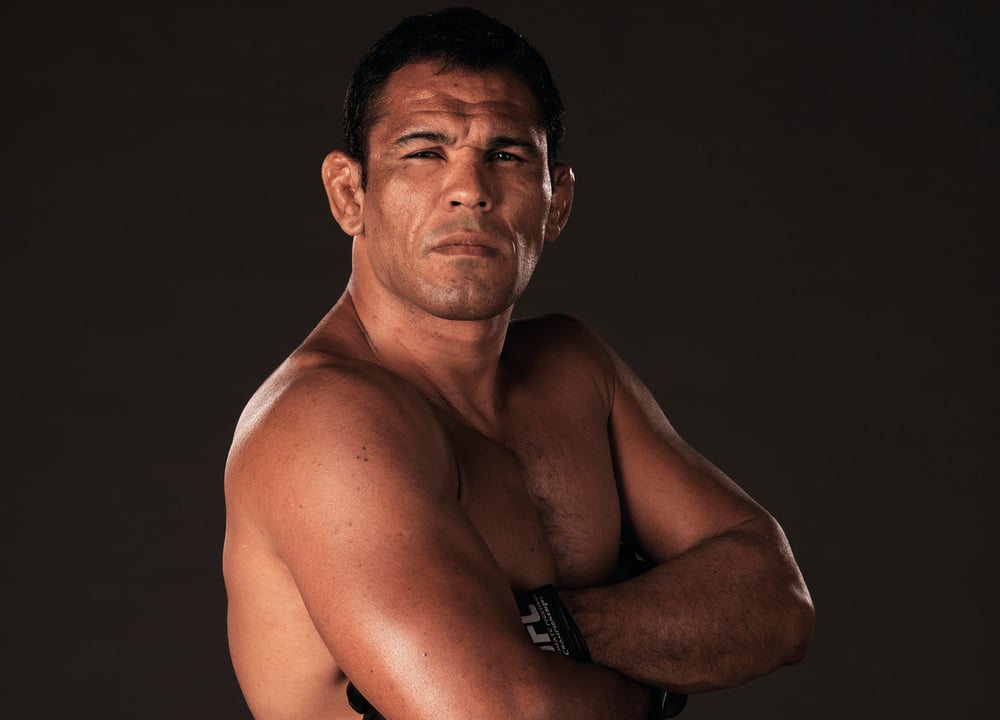
7 Belt Holder
So you earn your title shot and get it all right on the night. Your hand is raised and the crowd salutes you. The goal you have been working towards your whole career has been achieved. You are a true champion.
Think again. Winning a title makes you a champ in name only. All around the globe, organizations of varying degrees of quality are wrapping gaudy trinkets around the waists of fighters of varying degrees of quality and calling them world champions.
Even in the big leagues, beating the man who beat the man is not enough. That qualifies you as a belt holder. Exhibit A is Matt Serra. Success in the fourth season of The Ultimate Fighter catapulted The Terror into a showdown with Georges St Pierre. GSP had decimated the welterweight division on the way to ripping the strap from his nemesis, Matt Hughes, and was an overwhelming favorite. In the closest MMA has come to a Buster Douglas-Mike Tyson moment, Serra upset the odds.
Matt Serra is a sharp, entertaining guy – he is also an accomplished fighter. A champion? Not really. He merely confirmed the truism that puts MMA above most sports in terms of excitement, that any one of the upper echelon guys has the capability of taking out anyone on the night. In his next fight, Serra did the decent thing and went to Montreal to give GSP his title back.
Some of the biggest names in the game have played the part of belt holder. Quinton Jackson, Forrest Griffin and Rashad Evans took turns modeling the UFC light heavyweight strap in the two years after the Chuck Liddell era. Rampage even managed a successful defense. Any one of them has the potential to be a champion in the future. For now, they are simply guys who held the belt in the period before a new champion came forward.
Notable Examples:
Minotauro was a bona fide champion in Pride, but in the UFC he was nothing more than a stopgap, a belt-warmer until the true champ came along.
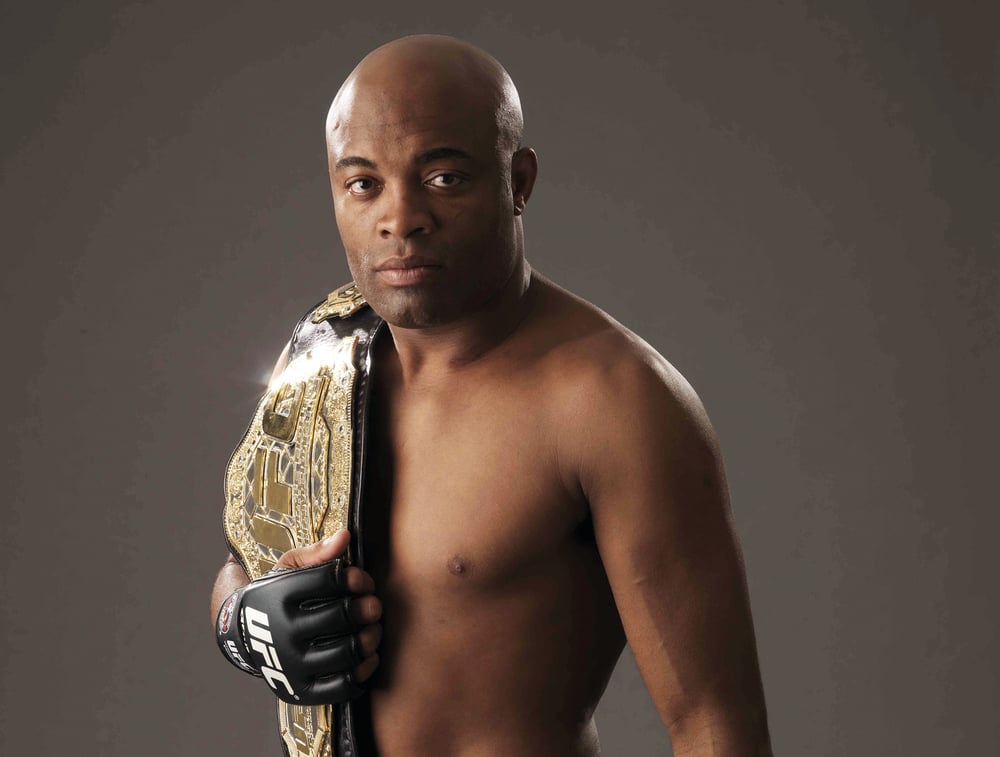
8 Champion
The term ‘undisputed champion’ has been mangled so much it is virtually meaningless these days. A champion must be the best fighter beyond any reasonable doubt. He must clean out his division and do so in a manner that confirms his status as the number one fighter in the minds of all who see him.
Sustained excellence makes huge demands on a man – skills are not enough. Phenomenal discipline is required to keep the body and the mind at a level that can conquer men who are up for the biggest fights of their lives. This special breed of man ascends to another plane. From a young age, boys will struggle for physical supremacy in the schoolyard until a definite pecking order is established. These scuffles take on different forms later in life, but the underlying current is part of what being a man is about. When a dominant fighter emerges, it stirs something inside. We may empathize with the trials and tribulations of the mortals on the supporting card, but a true champion earns our respect. In a world of chaos, they are a reassuring presence.
A champion has an aura that draws people to him. In the history of prizefighting, heavyweight champions have always drawn the greatest adulation. Fedor Emelianenko has been the sheriff keeping the big boys honest for years. Since Pride went away, some fans are sketchy about what belt ‘The Last Emperor’ actually holds, but it doesn’t matter. He is, by common consent, ‘The Man’. Purists want to see the old order maintained; young rebels want to see it torn down. New gunslingers in town are talked up, but always in relation to him. Every time he fights, it is an event. Every time the others fight, it is in his shadow.
Notable Examples:
Anderson Silva, GSP – if you can’t imagine anyone taking their titles any time soon, they’re a true champion, but they need to possess that special ‘something’. Both these men have it. What is it? It’s the stuff of champions, something mere mortals may not even begin to understand.


